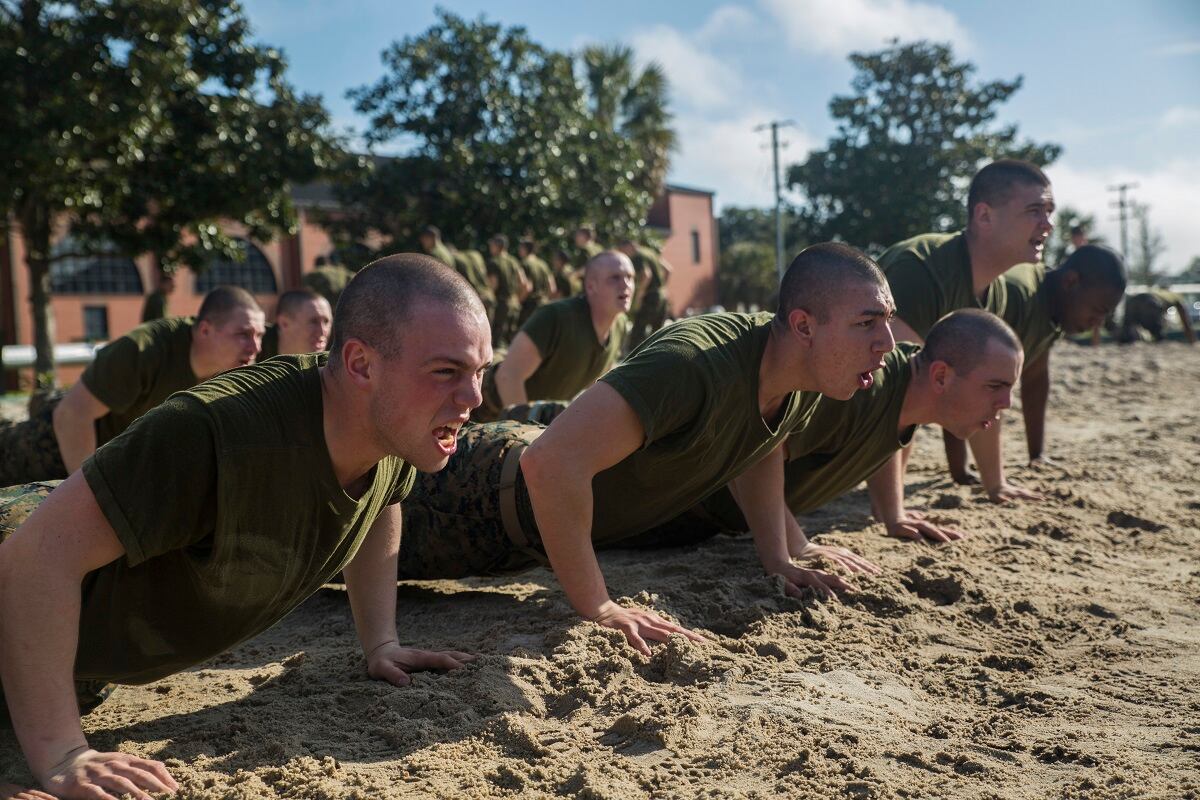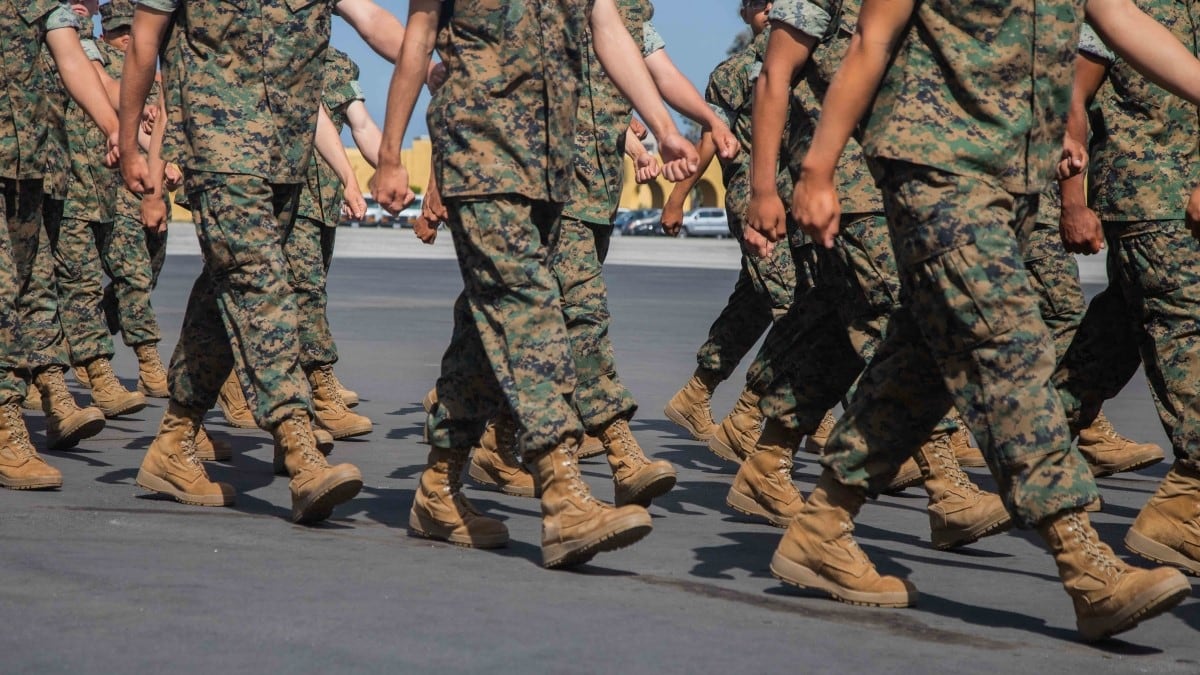A Marine drill instructor could face charges after an investigation found he subjected female recruits to unwanted touching and peered into a porta-potty that was occupied by a recruit.
A March investigation directed by the Recruit Training Regiment at Marine Corps Recruit Depot San Diego determined the drill instructor had “created a toxic culture” and recommended punitive action, including charges under military law.
Female recruits told the investigating officer that the drill instructor also asked them if their “hot moms or sisters” were coming to graduation and grabbed one of them by the head to make her do what was apparently his laundry.
Marine Corps Times obtained a copy of the investigation report via a public records request under the Freedom of Information Act. In that copy, all names were redacted.
RELATED

The redactions make it unclear exactly what rank or position the drill instructor held, but the investigation report refers to him as a staff noncommissioned officer, meaning he was at least a staff sergeant, or an E-6. The alleged misconduct all appeared to have taken place in the regiment’s Company C.
“While the investigation is complete, the judicial proceedings are still pending, and no additional details can be released at this time,” Marine spokeswoman Capt. Bridget Glynn told Marine Corps Times in August via email.
Glynn said that the investigation in question contains the only substantiated allegation of misconduct by drill instructors at the San Diego depot in 2023. The spokeswoman did not respond by time of publication to a follow-up question about whether the drill instructor was still responsible for training recruits.
In a process that started in 2021, Marine boot camp has become gender-integrated at the company level, but it remains single-gender at the smaller platoon level. The Marine Corps is the only military branch that hasn’t fully integrated recruit training by gender, Marine Corps Times previously reported.
The investigation began after a Dec. 12, 2022, incident in which the male drill instructor grabbed a female recruit by the head and said something along the lines of “I choose you. Meet me in the laundry room,” multiple recruits later told the investigating officer.
Another Marine then found that female recruit and another female recruit in the laundry room washing what they said were black sweatpants. The investigation didn’t specify to whom they belonged, but one recruit later told an investigator she heard the drill instructor say that day he needed two female recruits to do laundry for him.
An unnamed Marine — it’s unclear from the redacted investigation whether she was the same person who found the recruits in the laundry room — then told the recruits in that platoon to close their eyes and raise their hands if there was anything she needed to know about the drill instructor. Several hands went up, according to the investigation.
The ensuing investigation, completed in March, found the drill instructor “spoke unprofessionally, conducted himself in an unprofessional manner, and taught impressionable recruits and new Marines that these actions were acceptable in the Marine Corps.”
The Recruit Training Order, which provides instructions about how Marine boot camp should be conducted, does not specifically prohibit drill instructors from making a recruit do personal chores, but it does ban hazing.
Retired 1st Sgt. Patricia Hernandez, a former drill instructor who served in the Marine Corps from 1990–2009 after three years in the Army, said a drill instructor making recruits do his personal chores would cross a line.
Drill instructors shouldn’t take away from recruits’ allotted personal or training time without a good reason, said Hernandez, who did not review the command investigation but was told of its contents.
“If we think about this in a civilian manner, it would be like doing laundry for your boss,” Hernandez told Marine Corps Times.
The drill instructor at San Diego allegedly touched female recruits close to their breasts or buttocks, sometimes with the ostensible purpose of correcting heel alignment or checking their uniforms, according to the investigation.
The Recruit Training Order forbids drill instructors from touching recruits, except for purposes like correcting a recruit’s position or inspecting the recruit’s equipment.
“If I can get you to do what I need you to do, I should be able to do it with my example, with my words,” Hernandez told Marine Corps Times of the rule against touching recruits. “What is the purpose of touching?”
Three recruits said the drill instructor who was the subject of the command investigation removed the contents from their belts or pouches and reached into them. He brushed against their bodies in the process, they said.
At one point, the drill instructor told two recruits to pour water on his hands and dried his hands by wiping them up and down one of one of the pair’s backs, recruits told the investigator.
Three recruits said they saw the drill instructor peer into the vents of a portable toilet while another recruit was using it. The investigation doesn’t specify whether the recruit was female or male, but the alleged incident occurred while the female platoon was training nearby.
One recruit recalled that after the drill instructor found her sitting on the floor cutting loose threads off her uniform, he grabbed her by the hand and forced her to cut a loose thread off his uniform.
Multiple female recruits said he had asked them in the classroom whether they had any “hot moms or sisters” who would be coming to graduation. During the Crucible, the culmination of recruit training, he told them he was interested in meeting Hispanic women in particular, recruits told the investigator.
One female recruit, who planned to work in motor transport, recalled the drill instructor looked her up and down after she conveyed her career plans and said to her, “Oh, Motor-T, huh? Easy job! But you must’ve chosen that job to have fun with guys, huh?” according to the investigation report.
Female recruits recounted the drill instructor calling them “fat pigs” or “hippos” while they were eating or about to eat.
The Recruit Training Order forbids drill instructors from giving recruits nicknames or using unprofessional language.
In a high-profile trial in July at Parris Island, South Carolina, a senior drill instructor was found not guilty of negligent homicide in connection with the 2021 death of recruit Pfc. Dalton Beals but guilty of an orders violation for calling his recruits nicknames like “war pigs.”
That senior drill instructor, Staff Sgt. Steven T. Smiley, was reduced in rank to sergeant and barred from reenlisting, his attorney previously told Marine Corps Times.
In this case in California, the drill instructor admitted in an interview with the investigating officer to grabbing a recruit by the head and making her do or grab laundry.
He denied brushing up against recruits’ breasts or buttocks and said he adjusted the equipment of male and female recruits alike. He claimed he wiped his hand off on a recruit because she had gotten mud on it.
He acknowledged asking recruits about their “single or hot moms.” He said he asked the question because a male recruit, whose single mother would attend graduation, previously had asked him if he wanted to become his stepdad.
Male recruits told the investigating officer the drill instructor hadn’t touched them inappropriately, called them names, asked them about “hot” relatives or otherwise acted unprofessionally around them. One male recruit said he did notice the drill instructor was often with the female recruits and knew all their names.
The investigating officer initially examined whether the drill instructor had violated Article 120, which covers rape and sexual assault. She ultimately recommended the command consider punishing him under Article 92, which covers failure to obey an order or regulation, and Article 134, which covers a broad range of misconduct.
“These types of behavior are unacceptable,” the investigating officer wrote in the March investigative report, adding that the drill instructor was “not an accurate representation” of the instructors training the next generation of Marines.
Hernandez, the former Marine Corps drill instructor, told Marine Corps Times the standard for drill instructors’ behavior is high for a reason.
“We have to act professionally,” the retired Marine said. “We are what [recruits] want to become. We set that example.”
Irene Loewenson is a staff reporter for Marine Corps Times. She joined Military Times as an editorial fellow in August 2022. She is a graduate of Williams College, where she was the editor-in-chief of the student newspaper.




